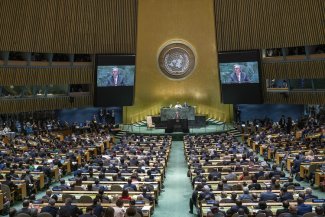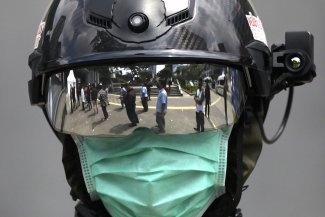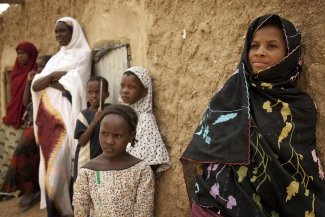UN peacekeepers in Mali carry out activities with the population of Gao, including water and medicine distribution operations, as pictured here in July 2017.
Water shortages, crop failures leading to famine, forest fires, but also riots linked to the cost of living, increased terrorism, pandemics and epizootics, climate refugee flows: the list of disasters linked to climate upheaval is constantly growing. One of the missions of the United Nations is to provide tools for reflection and discussion to address these growing risks.
On 13 December 2021, two very different countries, Niger, from the Global South, and Ireland, from the Global North, jointly tabled a draft resolution at the UN Security Council establishing the close correlation between climate and security, which could have been used to put pressure on states and multinationals to curb global warming. It called for a report on the influence of climate change on the crises managed by the Security Council, and more training on the issue for peacekeeping teams. The initiative came on the heels of the Glasgow Climate Pact adopted at COP26 in Scotland in November 2021, which established that rising temperatures pose and will continue to pose increasing security threats, as the Irish ambassador to the UN, Geraldine Byrne Nason, stressed at the time.
Russia, however, immediately vetoed the text, considering it “unacceptable” and arguing that there had not been sufficient negotiations on the subject. Russia’s fear – even before it launched its military attack on Ukraine – was that the UN would interfere in its internal affairs and spheres of influence. The project was supported by 12 of the 15 members of the Security Council and by 113 of the 193 members of the General Assembly, including a majority of countries from the South, which are the most vulnerable to climate risks.
Putin’s “climate relativism” and the veto system criticised
The US representative strongly criticised Russia for its veto, which, she said, prevents the most important body in the world from taking a small step to combat the impacts of climate change. Russia is no stranger to using its veto: it has exercised it 115 times in total since 1945 (out of a total of 208 vetoes), on a range of issues, paralysing the UN and the whole system of multilateralism. The United States comes second, with 83 vetoes.
According to historian Laurent Coumel, a lecturer at INALCO, a university specialising in languages and world cultures in Paris, with whom Equal Times met, “Russia, or rather its leader, does not fully believe in climate risks. Putin has long been an outspoken climate sceptic and could be described as a ‘climate relativist’ in the sense that he partly considers the effects of climate change on his country to be negligible. It is the most hydrocarbon-dependent country on the Security Council: half of the Russian state budget comes from taxes on oil and gas exports.” Russia’s UN ambassador, Vasily Nebenzia, disputed the link between global security problems and global warming, saying that the resolution would lead to ‘‘confusion and duplication’’ and that each global security problem should be addressed separately.
India also voted against the resolution, saying that the Council was “not the place” to discuss the issue of climate change, and that the climate crisis is essentially about economic development, not security. China abstained, unable to go against the majority of the countries in the South, which were overwhelmingly in favour. Russia, China and India also proposed an alternative draft resolution focusing on the Sahel, which was not adopted, and which could be interpreted as an attempt to increase their influence in the region.
The UN secretary general, António Guterres of Portugal, himself stressed that “climate change is not the source of all ills, but it has a multiplier effect and is an aggravating factor for instability, conflict and terrorism”.
The ambassadors from Ireland and Niger criticised the veto system in the Security Council and its ability to block draft resolutions that have majority support, calling it “an anachronism” that reflects the state of international relations in 1945 and not today, and calling for the veto to be abolished.
Indeed, the countries of the South are in the majority at the UN. Since 1964, they have been grouped together in the “G77” (originally a group of 77 countries that has now risen to over 130). But their voice carries little weight in the General Assembly, and it is always the powers with the veto that succeed in imposing their point of view, which is increasingly seen as an injustice. The countries of the South, which are the first to suffer from climate disasters, argue that global warming dramatically increases the risk of terrorism.
Identifying the risks and perils
The UN, moreover, is now being overtaken by NATO on this issue: in June 2021, its members stated that NATO should become the benchmark organisation for understanding and adapting to the challenges of climate change. At its last summit, the organisation proposed an action plan.
The Pentagon, together with its branches, the FBI and the CIA, also intend to act on this issue. The CIA recently published its outlook report Global Trends 2040: A More Contested World with a specific section on environmental and climate issues. According to the report: “Countries of particular concern are those with ethnic or religious polarisation; livelihoods highly dependent on natural resources or agriculture; weak or illegitimate conflict resolution mechanisms; a history of violence; and low adaptive capacity.” Among the most worrying inter-state conflicts identified in the report are those in the Arctic and the Nile Valley, both of which are experiencing the collateral effects of climate change.
Amongst those establishing the link between global warming and terrorism in Africa is the German think tank Adelphi. Susanne Wolfmaier, a climate risk advisor for the think tank, interviewed by Equal Times, says that the drying-up of the Lake Chad Basin, on which 30 million people depend for water, is causing many intercommunal conflicts, which are strengthening the grip of the terrorist group Boko Haram. Similarly, Wolfmaier notes that in Somalia, since the severe drought of 2011, the Islamist group al-Shabaab has taken advantage of the impact of global warming to strengthen its hold in the country.
Awareness of this serious problem is not new. Political scientist Lucile Maertens has studied the subject of climate change at the UN and recalls that, as early as 10 January 2017, in his first address to the Security Council, Guterres had already stated that most of today’s conflicts were “fuelled by competition for power and resources” and “aggravated by climate change”. Climate change as an “economic and security imperative” was also discussed at COP21 in Paris in 2015.
The G77 is divided on the issue. In 2013, “Guatemala criticised the Security Council for discussing climate change issues when the most vulnerable countries have no voice in it,” Maertens told Equal Times. “The least developed countries and small island states have, however, spoken out in favour of putting climate change on the Council’s agenda, seeing the move as an assurance of a more serious commitment from the international community on climate issues.”
For Maertens, “the Security Council still has little room for manoeuvre: climate change highlights the limits of the current workings of this body, which is ill-equipped to respond to multidimensional, cross-border and cross-sectoral security threats.”
The rejection of this draft resolution is not, however, necessarily irreversible. Its mere existence attests to a groundswell, a growing awareness among many states, North and South, and to their willingness to come together and join forces to address an increasingly concrete global ecological and security disaster. The proposed resolution, however symbolic, marks a step forward.
The latest IPCC report, published on 28 February 2022, which stresses that climatic and environmental risks will increase exponentially in the near future, seems to add to this awareness. The current conflict in Ukraine also attests to this correlation. “Climate change and conflicts have the same roots: fossil fuels,” says Ukrainian activist Svitlana Romanko from the Zero Fossils Fuels Campaign.
In an open letter published on 3 March 2022, several NGOs, including 350.org, drew the international community’s attention to the role played by fossil fuels in driving geopolitical conflicts. There is, clearly, an urgent need for nations to unite and work together towards a post-oil global society and an ecological transition that would help mitigate the severity of geopolitical conflicts.













